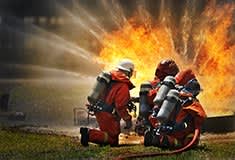Earning a Fire Science Bachelor’s Degree
Bachelor’s Degree Programs: An Introduction

Four-year bachelor’s degree programs combine a concentration of courses in a major field with a well-rounded liberal arts education. For example, in the fire sciences, students complete career-focused courses in the major along with classes in the arts, humanities, social and physical sciences that fulfill general education requirements. Programs typically require students to complete 120 total credits toward the degree, comprised of major, minor, general education and elective classes. At some schools, students that already hold an associate degree may shorten their bachelor’s time-to-completion if prior courses are transferable.
Recommended Schools
Bachelor’s Degrees in Fire Science and Emergency Services
Fire schools, colleges and universities offering traditional and online bachelor’s of science degrees often feature several role-focused majors in the fire and emergency services field. Typical BS degrees may be named:
- BS in Fire and Emergency Management
- BS in Fire Science
- BS in Fire Engineering
- BS in Fire Protection Engineering
- BS in Fire Inspection
- BS in Fire Administration
- BS in Fire and Arson Investigation
- BS in Emergency Medical Services
- BS in Paramedic Care
What Careers Are Possible with a Bachelor’s Degree in Fire Science?
A bachelor’s degree in the fire sciences provides students with advanced expertise in the specialized fields of fire prevention, fire suppression, emergency response management, fire safety, arson and incident investigation, and leadership. Programs deepen professional knowledge required for promotions and departmental advancement and prepare graduates to meet challenges in human resource management, fire technology, financial planning, and inter-agency coordination. Some roles that may require a bachelor’s degree include:
- Fire Inspectors and Investigators
- Fire Educators
- Fire Prevention Specialists
- Fire Station Chiefs
- Fire Loss Insurance Professionals
While earning a bachelor’s degree won’t guarantee a graduate’s rapid advancement, it can bolster professional credentials and distinguish candidates from the pack.
Fire Science Bachelor’s Degree Coursework
Four-year coursework in fire science is divided among general education liberal arts and science courses, major studies in fire science specialties, and elective classes that offer studies in the fire and emergency services curriculum.
The following table illustrates the academic levels of fire and emergency response courses along with several general education classes that complete the degree:
| Course Name | Description |
| Building Construction and Fire Prevention | Comprehensive overview in structural design, building materials, and building occupancy types in relation to fire prevention and firefighter safety. |
| Quantitative Reasoning | Students learn to employ statistical and mathematical models to resolve real-world problems. Satisfies general education requirement. |
| Incident Command Systems | Methodologies for successfully commanding and coordinating emergency operations, including HAZMAT, wildland fire, structural failure, high-rise, highway, and multi-casualty incidents. |
| Investigation and Analysis | Students learn and review key technical principles, methods, and legal aspects in conducting an arson investigation. |
| Public Speaking | Theory and practice of effective oral communication including overcoming stage fright and building presentation skills. Satisfies general education requirement. |
| Human Resource Management for Fire and Emergency Services | Understanding best-practices for leadership styles in addressing personnel recruitment, development, collective rules, and promotion issues that challenge leaders in fire and emergency related organizations. |
| American Politics | Introduction to institutional foundations of American politics including studies of the development of parties, political elites, and the class systems. Satisfies general education requirement. |
| International and Homeland Security | Understanding military/security doctrine and applications of force in response to national/international emergency scenarios. Examines the role of the Department of Homeland Security. |
Inside Online Bachelor’s Degree Programs

Accredited online bachelor’s degree programs in fire science are tailored to meet the needs of working professionals or students with family obligations that preclude them from attending traditional degree programs. Students can enroll, complete assignments, view lectures and demonstrations, take exams, and collaborate on projects with peers without leaving their home or work computers. Courses are delivered through a central dashboard, giving students access to streaming video and multimedia presentations, email communications, chat tools, discussion boards and class conferencing.
Online courses are identical in academic content and quality to traditional classroom courses and accredited degrees are respected in the fire service community. For classes requiring hands-on laboratories and workshops, online schools host short, intensive sessions on campus or at a participating fire and emergency service organization in communities where online students work or reside.
Fire Programs and College Accreditation
Accreditation can uphold the long-term value of a college degree along with qualifying the school or college for participation in federal student financial aid programs such as loans, grants and scholarships.
When a college or fire science program receives accreditation, it has been vetted by an independent evaluator who measures the school against national or regional academic and training standards. Fire and emergency service degree programs are commonly accredited by one of six regional agencies authorized by the U.S. Department of Education and the Council for Higher Education Accreditation (CHEA). Students should investigate whether their prospective school is also certified by the Fire and Emergency Services Higher Education (FESHE) or The International Fire Service Accreditation Congress (IFSAC). The Distance Education and Training Council (DETC) is one of several accreditation agencies that evaluate online fire education programs.






